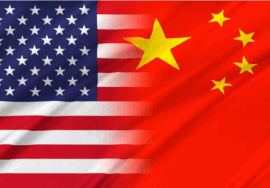Shipping Expert Warns of Global Fallout from Russia’s Invasion of Ukraine
[ad_1]
Oleg Yanchyk is the Chief Information Officer at Sleek Technologies, which works with some of the largest shipping and logistics enterprises in the world. He recently offered some insight on the evolving conflict in Ukraine, and the impact it could have on manufacturing in the U.S. and numerous other markets.
Jeff Reinke, editorial director: Outside of Russia and Ukraine, what countries or customer bases will be impacted the most from a Russian invasion of Ukraine?
Oleg Yanchyk, CIO, Sleek Technologies: Because of Ukraine’s location it is one of the biggest – and likely one of the most overlooked – cogs in the global supply chain today. With an estimated transit potential of 200 million tons per year, Ukraine serves as a key bridge between western and eastern Europe – to say nothing of the country’s importance in the inter-continental sea transit supply chain due to its numerous Black Sea ports, such as Odessa, Mykolaiv and others.
Therefore, the ripples of this conflict will be felt throughout Europe, Asia and the Middle East – particularly in countries such as Germany, Turkey, Poland and China, which have deep trade ties with Ukraine.
One of the additional considerations is the relationship between Belarus and Russia. Belarus also occupies a key location in the flow of goods between eastern and western Europe, and has better relationships with Russia than Ukraine. That said, if Belarus continues to be aligned with Russia it could make it even more difficult to circumvent Ukraine.
In addition, this crisis will also have far-reaching impacts that will touch the U.S. Hundreds of millions of dollars in direct trade passes between the U.S. and Ukraine – including U.S. exports of vehicles, aviation equipment and other types of heavy machinery. Thus, these disruptions will add additional “insult to injury” for many industries in the U.S. that have already been struggling as a result of the pandemic.
JR: How will shipping and logistics be impacted?
OY: Unfortunately, because of the ongoing conflict that has occurred in Ukraine over the last eight years, the Ukrainian supply chain and logistics industries are no strangers to having to adapt to disruptions – particularly in eastern Ukraine. Supply chain organizations around the world have been working hard to build more resilience into their operations following the sourcing issues that arose as a result of the COVID-19 pandemic.
That said, supply chain and logistics companies are notoriously slow moving when it comes to adopting technology and thus many are still in the early days of getting their feet under the table in terms of how to best use technology. Therefore, many supply chain organizations may not be able to adapt as quickly as they would like to this conflict, which means they will likely have issues driving success in terms of freight procurement, logistics planning alterations, sourcing and other high-priority areas.
With that in mind, now is the time for companies with operations in Ukraine to begin to lean more heavily into their technology resources and talent to find ways to get contingencies in places as well as they possibly can.
Additionally, while there was positive energy around digital transformation within the industry, virtually all supply chain organizations may now feel like they have to take a step back from their future-looking modernization efforts as they are being forced to triage new challenges posed by this crisis.
However, it is imperative that if we are going to solve the long-term challenges the industry is facing, that we split our attention on both the issues of today and tomorrow. Otherwise, we will be stuck in the existing mire much longer than we could have been.
JR: Oil and gas seem to be the supply chains where the most disruption is expected. Are there others?
OY: Oil and gas is certainly a foremost focal area in terms of disruption. However, because Ukraine is a heavy exporter of industrial supplies as well as agricultural goods, numerous industries are likely to be directly and indirectly impacted – particularly those that rely on Ukrainian iron and steel. This will ultimately not only result in prices skyrocketing, but many fear that it will also result in a “run” on certain products with companies engaging in protectionist buying that will make supplies even more scarce.
Oleg Yanchyk is the CIO, of Sleek Technologies, which works with some of the largest shippers and carriers in the world.
[ad_2]
Source link










